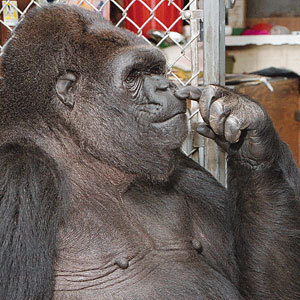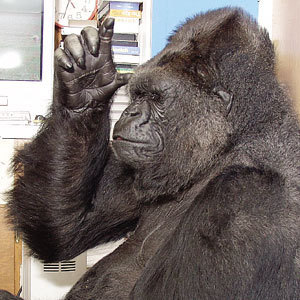OPTIONAL THEME:
KNOWLEDGE AND TECHNOLOGY
GORILLAS, ROBOTS AND PERSONHOOD
The unit consists of ten guiding questions based on highlights from a paper written by Dr Francine Penny Patterson, who is President and Research Director of The Gorilla Foundation.
“
She laughs at her own jokes and those of others. She cries when hurt or left alone, screams when frightened or angered. She talks about her feelings, using words like ‘happy’, ‘sad’, ‘afraid’, ‘enjoy’, ‘eager’, ‘frustrate’, ‘mad’ and, quite frequently, ‘love’. She grieves for those she has lost―a favourite cat who has died, a friend who has gone away. She can talk about what happens when one dies, but she becomes fidgety and uncomfortable when asked to discuss her own death or the death of her companions. She displays a wonderful gentleness with kittens and other small animals. She has even expressed empathy for others seen only in pictures.
”
Students should be assigned at least 10 minutes to explore online Project Koko at the Gorilla Foundation. The site contains an extensive archive of short Koko videos.
THE “CLEVER HANS” EFFECT
Clever Hans was a German horse that amazed European crowds by apparently stamping out the answers to math problems. Subsequent scientific trials proved that Hans was reacting to the subconscious body cues of his trainer and audience members rather than actually counting. Recognition of the “Clever Hans effect” led to “double blind” testing in psychology experiments.
To what extent is Koko the gorilla’s sign language success free of the “Clever Hans effect”?
PERSONHOOD AND INDIVIDUAL RIGHTS
The concept of personhood informs explorations of ethical issues like late-term abortion, animal rights, vegetarianism, euthanasia and the potential rise of artificial intelligence.
GENERATIVE QUESTIONS FOR CLASS DISCUSSION
What defines personhood?
Are human infants persons?
Are very severely mentally impaired people persons?
Was Koko a person?
Is an intelligent alien life form a distant planet a person?
Is your pet dog a person?
Are the enemy in a bloody foreign war persons?
Is a fetus in the third trimester a person?
Is an older person suffering from severe senile dementia―who previously had been living a productive and fulfilling life―a person?
Are there general rules or principles that can guide our thinking about moral status and individual rights?
In the future, self-aware machines may be developed. Can we imagine making the case for personhood for a sentient silicon-based machine?



